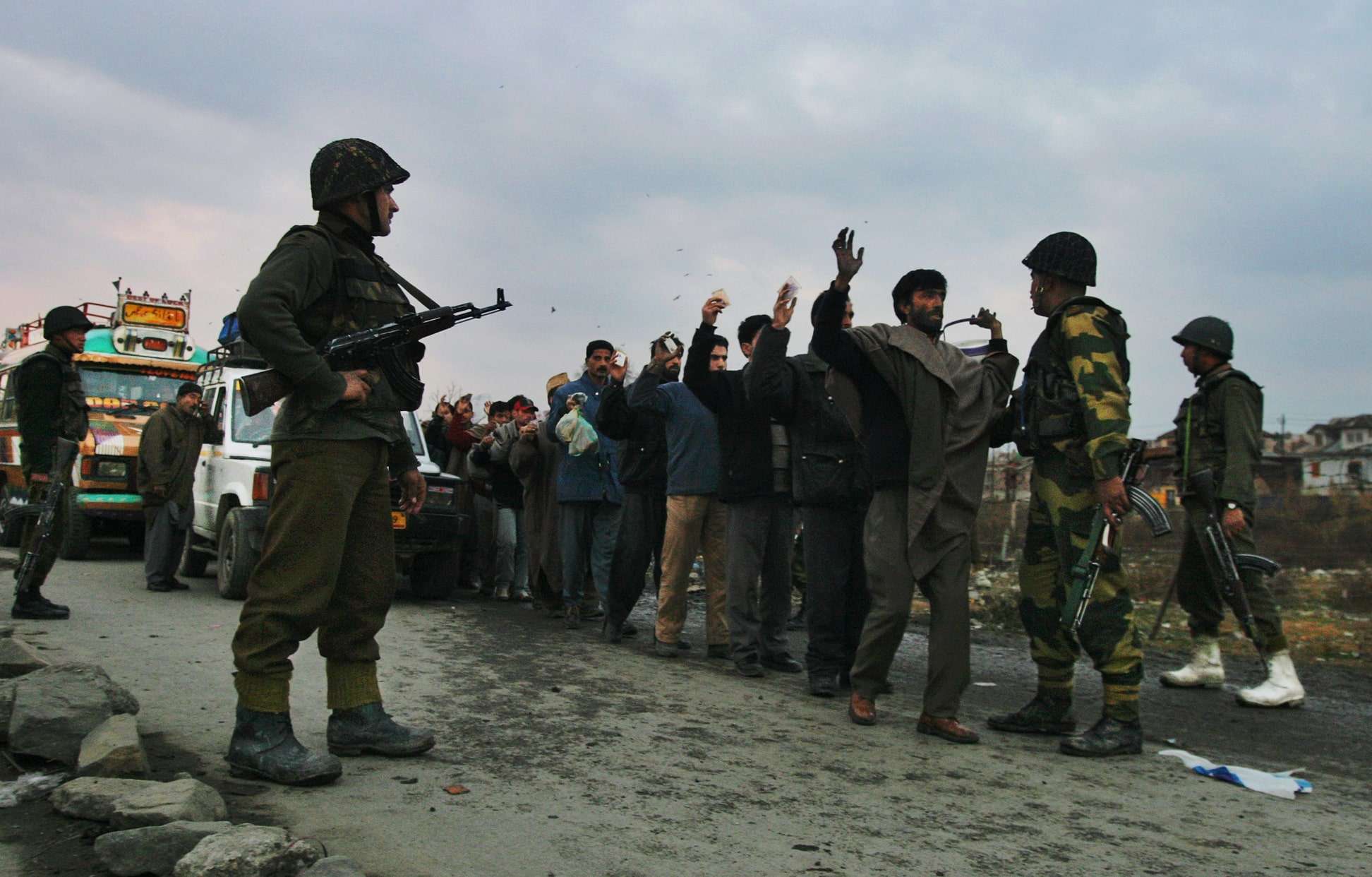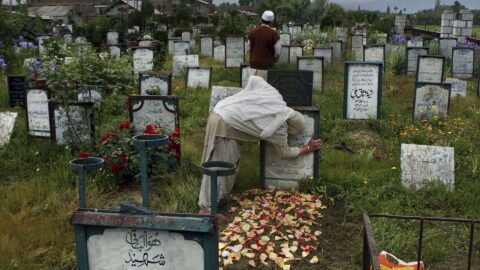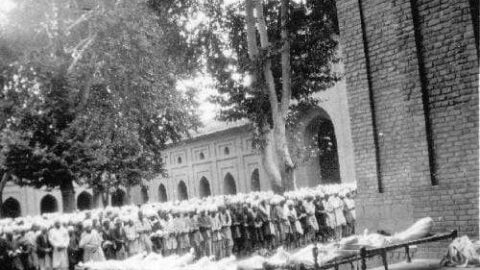Chicago, United States — Justice for All expresses deep sorrow at the passing of Professor…
Collective Punishment: How the Delhi Blast Became a Pretext for Repressing Kashmiris
A Mini-Report on India’s Response to the November 10 Attack
Justice for All — When a bomb exploded in a Delhi marketplace on November 10, killing at least 13 people, the Indian state’s response was swift—but not in the way counterterrorism experts would recognize.
Within a few days, over 1,500 Muslims had been detained across Kashmir in what amounts to one of the most extensive campaigns of collective punishment in recent Indian history.
The Immediate Response: Guilt by Identity
Hours after the blast—before any investigation had identified suspects—police began targeting Muslim communities nationwide. Videos emerged showing officers conducting “search operations” at railway stations, stopping travelers based on religious appearance.
In Barmer, Rajasthan, SP Narendra Singh Meena led teams checking Muslim passengers. Similar profiling occurred across Uttar Pradesh, Haryana, and Gujarat.
Right-wing social media accelerated the communal framing. The BJP-linked “Baba Banaras” account claimed without evidence that the blast car belonged to a Kashmiri Muslim, explicitly demanding mass arrests in Kashmir.
Commentator Abhijit Iyer-Mitra called for revenge against Muslims.
Mainstream outlets repeated official narratives about “Islamic terror networks” without verification, cementing the association between the attack and an entire religious community.
Kashmir Bears the Brunt: Mass Raids and Preventive Detention
By November 13, Kashmir—hundreds of miles from the blast site—became the primary target. In Kulgam district alone, police conducted coordinated raids at over 200 locations. Over the span of four days, authorities carried out more than 400 cordon-and-search operations across the district, focusing on areas previously associated with encounters and alleged militant hideouts.
Officials confirmed that approximately 1500 people with alleged links to banned pro-freedom organizations have been questioned and detained.
Many were bound down and transferred to District Jail Mattan under preventive detention laws—held indefinitely without charges or trial.
Police seized documents, digital devices, and what they termed “incriminating materials,” though no independent verification was provided.
Similar operations swept across Baramulla, Budgam, Islamabad (known as Anantnag as well), Pulwama, and Shopian, with authorities conducting over 30 additional cordon-and-search operations in Baramulla alone.
Homes of militants killed months or years earlier were raided, their families interrogated and relatives detained on suspicion of association.
Voices from the Detained: Nocturnal Terror and Absent Justice
Justice for All was able to communicate with the family members of those illegally incarcerated.
“They came at 2 a.m., broke down our door, and dragged my husband out in his nightclothes,” says Zainab Mir (name changed), whose husband was detained in Shopian district.
“They beat him in front of our children, ransacked our home, took his phone and computer. When I asked what he’d done, they said he was being held ‘preventively.’ It’s been days—I don’t know where he is.”
Her story echoes across Kashmir. Rashid Ahmed’s (name changed) elderly father was taken from their home in Kulgam during a midnight raid. “He’s 67 years old, has diabetes and heart problems. They came with fifty armed men, terrorized the whole neighborhood, and took him away. No warrant, no charges, no explanation. His only ‘crime’ is that his nephew was killed in an encounter three years ago—a nephew he hadn’t spoken to in a decade.”
Sameera Abdullah (name changed), a teacher in Baramulla, describes watching security forces cordon off her neighborhood at dawn. “They came house to house, checking every man’s phone, interrogating everyone. My brother-in-law was taken because someone in his contact list was ‘suspicious.’ That night, twenty families in our neighborhood had men taken away. None of us know where they are or what they’re accused of.”
The testimonies reveal a systematic pattern: nocturnal raids designed to terrorize, physical assault during detention, seizure of property without proper documentation, and complete absence of due process.
Families report being unable to locate detained relatives, denied access to legal counsel, and given no information about charges or evidence.
The Anatomy of Collective Punishment
What distinguishes this crackdown from legitimate counterterrorism is its fundamentally indiscriminate nature. Authorities are not pursuing individuals with established connections to the Delhi bombing—they are punishing entire communities for an attack most had nothing to do with.
The detention of family members exemplifies the collective punishment logic. Across Kashmir, police arrested relatives of suspected militants—fathers, brothers, cousins—under the theory that family ties constitute grounds for detention.
This directly violates international humanitarian law’s explicit prohibition on collective punishment, which forbids holding groups responsible for individuals’ actions.
“When you start arresting people not for what they’ve done, but for who they’re related to or where they live, you’ve abandoned justice entirely,” explains a civil rights lawyer.
“This is textbook collective punishment—sending a message to an entire community that you are all suspect, all potentially guilty.”
A Pattern, Not an Exception
This response follows a well-established pattern intensified since Article 370’s abrogation in 2019.
After the Pahalgam attack in April 2025, similar mass raids swept Kashmir with hundreds detained.
Each incident follows the same script: attack occurs anywhere in India, media amplifies communal suspicion, authorities conduct sweeping operations in Muslim areas, hundreds are arrested under vague accusations of being “overground workers” or “sympathizers.”
The psychological impact extends far beyond those physically detained. Entire communities live under constant surveillance, knowing arrest could come at any moment for any reason.
Young Kashmiris watch innocent fathers taken in midnight raids. Professionals see careers destroyed by baseless accusations. The terror of nocturnal raids becomes normalized.
Legal Framework Enabling Mass Detention
India’s preventive detention laws—particularly the Unlawful Activities Prevention Act (UAPA) and Public Safety Act (PSA)—provide the legal architecture for this system. These laws allow authorities to hold individuals up to 180 days without charges based merely on suspicion of future criminal activity.
When applied to 1,500 people in a week, when criteria like “overground worker” or “associate of militants” can mean anyone, the rule of law becomes meaningless.
Judicial oversight proves largely ineffective. Courts typically defer to security agencies’ claims about classified intelligence.
Defense lawyers cannot challenge evidence they cannot access. Families learn of arrests hours or days later. The system is designed to operate outside normal legal constraints.
The Self-Fulfilling Prophecy
Perhaps most dangerously, collective punishment creates the very radicalization it claims to prevent. By treating entire communities as suspect, by arresting people based on association rather than evidence, by conducting military-style nocturnal raids in civilian areas, authorities risk producing the alienation they ostensibly seek to combat.
Every teenager who watches his innocent father beaten and dragged away, every professional whose career is destroyed by false accusations, every family traumatized by preventive detention—these are experiences that breed resentment and the conviction that justice within India’s system is impossible.
“How do you expect us to believe in India when India treats us like this?” asks a Kashmiri civil society activist. “A bomb explodes in Delhi, and we get arrested in Kashmir. Our fathers are beaten in midnight raids. Our cousins are interrogated. Our homes are ransacked. What conclusion are we supposed to draw except that we’ll never be treated as equal citizens?”
Conclusion: Democracy Under Siege
When 1,500 people can be detained in a week with minimal oversight, when 400 cordon-and-search operations can be conducted in four days in a single district, when families are terrorized in nocturnal raids and denied all due process, when media amplifies rather than questions state narratives of mass guilt—the foundations of democratic governance are at risk.
The Delhi bombing deserved a criminal investigation focused on actual perpetrators. What followed was collective punishment masquerading as counterterrorism—a response that may ultimately prove far more dangerous to India’s security and democratic future than any act of terrorism. When an entire community is treated as perpetually guilty, when kinship becomes evidence, when midnight raids and indefinite detention without charges become routine, India has crossed the line from democracy into something far darker.
Authorities have not released comprehensive information about those detained, their locations, or evidence connecting them to the Delhi bombing. Most families remain unable to contact detained relatives or access legal representation. Police officials in Kulgam stated they maintain a “zero-tolerance approach” toward militancy-related activities.




